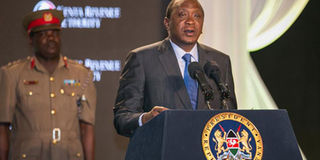Don’t politicise lifestyle audit as that only ‘incriminates’ opposers

President Uhuru Kenyatta. He has ordered a lifestyle audit of all public officers. PHOTO | PSCU
What you need to know:
- A sudden change in lifestyle could be indicative of fraud or illicit activities to generate wealth.
- Holding public office in Kenya is viewed as a quick route to personal enrichment.
- Lifestyle audit is used to determine if a person’s lifestyle is consistent with their known income.
The opposition to the lifestyle audit on public officers recently ordered by President Uhuru Kenyatta is a strategy to sabotage the well-intentioned war on corruption.
By framing the audit as a witchhunt, they want to make it so politically tainted that it becomes impossible to fairly and objectively carry it out.
The hitherto soft murmurs, especially from a section of Rift Valley MPs, have now become open grumbles with claims that the audit targets Deputy President William Ruto with the aim of blocking his 2022 presidential bid.
Never mind that the DP has voiced his support for the President’s directive and publicly affirmed that he will submit to the audit.
History has taught us that in Kenya, whenever you politicise an issue, especially by introducing the ethnic card, even the best of intentions are doomed to fail. The same script was used to sabotage the Mau Forest rehabilitation efforts.
BUSINESS INTEREST
Lifestyle audit is used to determine if a person’s lifestyle is consistent with their known income. It would target their property, business interests and credit history to look for a mismatch between one’s income and wealth status.
Organisations use it as a fraud detection and prevention tool. A sudden change in lifestyle could be indicative of fraud or illicit activities to generate wealth.
A while back, there was a case of a county finance minister with a Sh85,000 salary whose bank accounts had transacted more than Sh400 million in 11 months.
He also had a fleet of six vehicles, several houses in posh estates and prime pieces of land. But did his known income justify the lavish lifestyle?
Such a person, or anyone implicated in dubious financial gains, must submit to the audit.
Holding public office in Kenya is viewed as a quick route to personal enrichment. Ultimately, the wealth is used to ascend to political office — which becomes a self-perpetuating trend as corrupt leaders acquire more wealth to consolidate their political power.
OVERNIGHT MILLIONAIRES
This was previously restricted to the national government but, with the advent of devolution, we have seen overnight millionaires in the counties.
There must be a reasonable explanation regarding a sudden increase in noticeable wealth.
Towards the end of his first term, President Kenyatta shocked the nation with his helpless “Mnataka nifanye nini? (What do you want me to do)?” — an admission by no less than the Commander-in-Chief that the corruption war was lost.
In his second and final term, he seems to have realised that several options are available to him as President, after acknowledging that corruption would not only tarnish his legacy but also undermine his ‘Big Four’ agenda.
By reorganising the leadership of key strategic institutions and departments mandated to lead the anti-corruption efforts, the President signalled his intention to deal with graft.
The zeal and seriousness with which the new Director of Public Prosecution and the Director of Criminal Investigations took up their duties not only triggered panic among the suspects but also heralded a new chapter in the anti-graft purge.
ANTI-GRAFT WAR
The Judiciary also appears to be playing ball, with no less than Chief Justice David Maraga affirming its support in the anti-graft war.
Kenyans on social media recently initiated their version of a lifestyle audit, sharing details of properties suspected to be owned by politicians and other public servants through a hashtag #WeKnowYourSalary. This was proof of the growing public support in the effort.
To be fair, some of the concerns raised about the audits are genuine but they cannot be an excuse to escape public scrutiny.
In a political process, lifestyle audits can be subject to manipulation and abuse if used in the wrong way. To insulate it from accusations of a witchhunt, the audit must be done professionally by the bodies recognised and empowered by the law.
VIOLATION OF RIGHTS
The law must also be followed in obtaining personal information to prevent abuse and violation of rights.
There must also be the understanding that the results of such audits are never conclusive and cannot be used to prosecute a person, they can only give clues which must be supported by evidence.
Those shouting the loudest against lifestyle audit give the impression that they have something to hide. But soon, the corrupt will have nowhere to run.
Dr Kamau, a political communications specialist, teaches at the Aga Khan University’s Graduate School of Media and Communications. [email protected]




